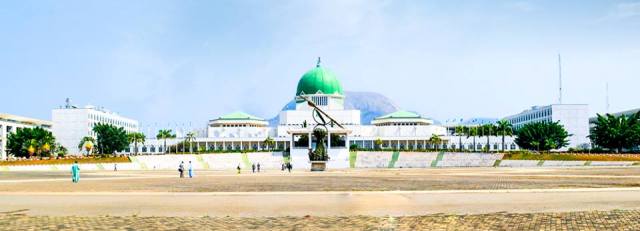 The National Assembly of Nigeria [Facebook picture].
The National Assembly of Nigeria [Facebook picture].
[This excerpt is an opinion piece appearing in The Round Table: The Commonwealth Journal of International Affairs.]
Since Nigeria’s return to democracy in 1999, there have been four successive civilian governments under the leadership of Presidents Olusegun Obasanjo (1999–2007), Umar Musa Yar’Adua (who was in office until his death in 2010), Goodluck Jonathan (2010–2015), and Muhammadu Buhari (2015-date) respectively. The praxis of horizontal accountability of power in contemporary Nigeria has always been a major defect of its democratic project. Even though the 1999 constitution of the Federal Republic of Nigeria (as amended) provides for a clear separation of powers between the three arms of government, the actual relations have been adversarial and combative.
In terms of the democratic artefact of horizontal accountability, the records of the Buhari government may not be impressive. There may have been instances of horizontal unaccountability of power on the part of the executive. First, the relationships between the executive and legislature have been anything but cordial. This was particularly the case during Buhari’s first term in office. The highhandedness of the executive manifested in a total disregard for legislative summons on many occasions and the invasion of the National Assembly complex by an agency of the executive – the Department of State Services (DSS) – in August 2018. This move was a flagrant abuse of the national constitution. Second, the judicial arm has also endured a hostile relationship with the executive arm. The Buhari government has consistently disregarded valid court orders. Another area that reflected the hostility between the executive and judiciary under Buhari was the suspension of Nigeria’s chief justice – Walter Onnoghen – on 25 January 2019 following an order by a tribunal, even though different superior courts had ordered a stay of proceedings. The objective of this article is to provide some explanations for these developments and chart the way forward.
One possible explanation for executive contempt for the other arms of government in Nigeria is its triumphalism. Under non-democratic regimes, the executive appears to be the irreducible core of government. The reason is that such regimes can exist without legislatures, judiciaries, constitutions or even political parties. However, they cannot survive without the executive organ to formulate general policies. The transition of a non-democratic regime to a democracy is therefore likely to transform the executive arm into an organic ‘champion’ in its functional relationships with the other organs. As the preeminent organ of government during Nigeria’s non-democratic military era, the executive has not been able to exorcise this triumphalism after two decades of democratic experience. The executive has conducted itself as an undemocratic body. When the executive muscles the other arms of government, it massages the whims of the executive and its agents even further, and hampers the democratic deliverables by these institutions.
More so, although President Buhari claimed to be a ‘born-again’ democrat, it appears he has not completely discarded the toga of authoritarianism that he wore as a military head of state some 35 years ago. His theoretical image of political governance is still largely defined by dictatorial tendencies and excessive use of the instruments of force (through the security apparatuses) even in civil matters. However, it will be unfair to use these attributes only in relation to the civilian government of President Buhari, as there were also some manifestations of such under the previous governments in Nigeria. In fact, these practices seem to have become the rule in Africa rather than the exception.
Abdulganiyu Jawondo & Roseline Oshewolo are with the Department of History and International Studies, University of Ilorin, Ilorin, Nigeria.
[Opinion pieces do not reflect the views of the Round Table Editorial Board].



